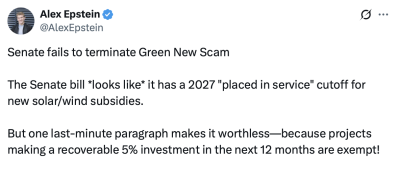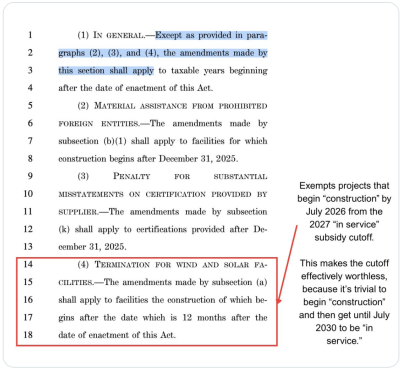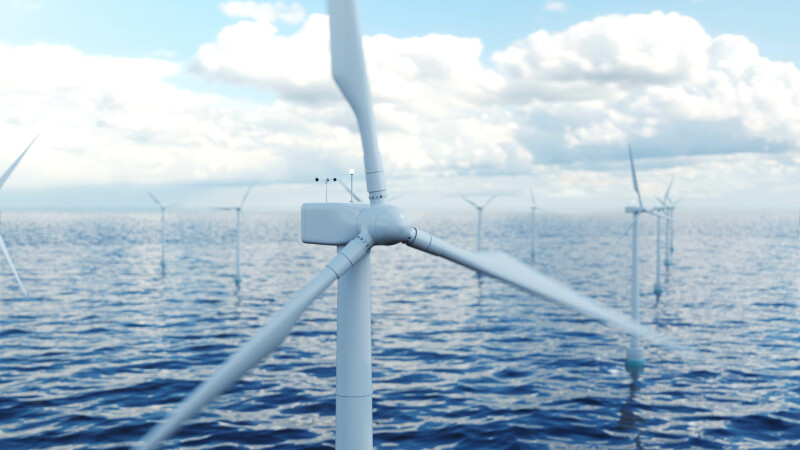The U.S. Senate’s squeaker 51-50 vote to approve the Trump administration’s program agenda appeared to strike a huge blow against offshore wind energy and other renewable energy development.
But opponents of offshore wind insist the legislation does not go far enough. The final version pulled back a proposed excise tax that would have penalized wind energy developers, after Iowa Sens. Joni Ernst and Chuck Grassley, both R-Iowa, opposed it for their state’s wind energy generation and manufacturing industry.
“The Senate bill looks like it has a 2027 ‘placed in service’ cutoff for new solar/wind subsidies,” wrote Alex Epstein, a prominent activist and fossil fuels advocate, in a fiery July 1 social media post widely shared among offshore wind opponents. “But one last-minute paragraph makes it worthless – because projects making a recoverable 5% investment in the next 12 months are exempt!”

President Trump pledged to stop all projects in U.S. waters “on day one” of his second presidency and issued an order hours after his Jan. 20 inauguration to implement that ban. In mid-April, Interior Secretary Doug Burgum ordered a halt to work on Equinor’s Empire Wind 814-megawatt project off New York, thrilling project opponents.
But a month later, the Trump administration relented, after making a deal with New York Gov. Kathy Hochul for permitting new natural gas pipelines from the Marcellus gas fields in Pennsylvania through New York State.
With the July 1 Senate vote, offshore oil and gas interests appeared to be clear winners. With final passage still required in the House – and continued criticism by the hardline Republican conservatives’ caucus – industry advocates pushed for support.
House opponents could undo the Senate changes, bouncing the package back to the upper chamber for another vote.
“This historic legislation will help usher in a new era of energy dominance by unlocking opportunities for investment, opening lease sales and expanding access to oil and natural gas development, said American Petroleum Institute president and CEO Mike Sommers. “We will continue to work with policymakers to get this final package to President Trump’s desk.”
Offshore wind industry advocates are still trying to salvage what they can, supporting moderate House Republicans who want to save renewable energy projects and jobs in their districts.
“The Senate reconciliation package is a step backward for American energy policy. The intentional effort to undermine the fastest-growing sources of electric power will lead to increased energy bills, decreased grid reliability, and the loss of hundreds of thousands of jobs,” American Clean Power Association CEO Jason Grumet said in a statement.
Still, Grumet noted it could have been worse for wind and solar developers.
“While the twelve-month phase out of clean energy tax incentives is very aggressive, the final bill avoids two punitive measures that would have needlessly harmed American energy production,” he said. “Notably, the Senate removed provisions that would have changed tax policy retroactively and undermined energy projects already in development. The legislation also removed a new tax increase targeting only wind and solar power that was added with no notice and little explanation.”
It's a mixed bag for offshore operators who work across the fossil fuel and wind energy sectors.
“While we appreciate the Senate’s efforts to improve the bill, particularly the refinements to key energy tax provisions, the changes still pose real challenges for continued investment in offshore wind,” said Erik Milito, president of the National Ocean Industries Association . “These provisions, though adjusted, remain material and would adversely affect long-term planning and capital deployment in offshore wind projects.”
“Across the Gulf Coast, oil and gas supply chain companies have already invested billions and made long-term strategic decisions. Offshore wind has allowed them to diversify, grow, and increase their competitiveness,” said Milito. “They are now leading efforts to establish the U.S. as a global leader in offshore wind.”
Wind power critic Epstein ramped up rhetoric to his social media audience, channeling the frustration of East Coast opposition groups who fear the Trump and Republicans are backtracking from his campaign promises.
“The current bill is a solar/wind lobbyist's dream. It does not terminate the Green New Scam in any way, shape or form. It absolutely perpetuates it,” Epstein asserted. “If the Senate wanted to extend the Green New Scam it should have said so, not insulted our intelligence by trying to bury the extension in one sneaky little paragraph.”





